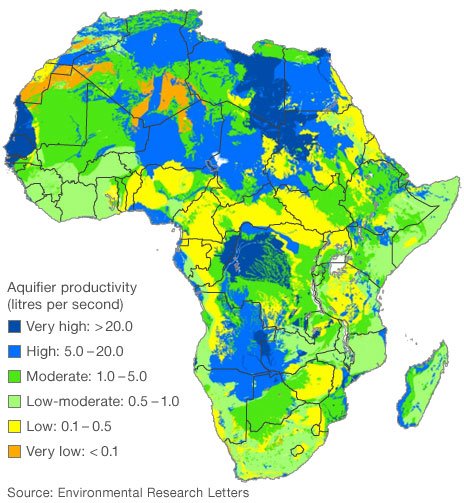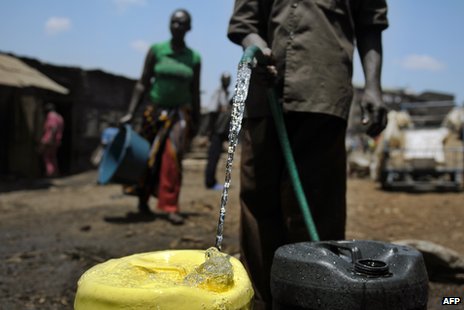'Huge' water resource exists under Africa
Scientists say the notoriously dry continent of Africa is sitting on a vast reservoir of groundwater.
They argue that the total volume of water in aquifers underground is 100 times the amount found on the surface.
The team have produced the most detailed map yet of the scale and potential of this hidden resource.
Writing in the journal Environmental Research Letters, they stress that large scale drilling might not be the best way of increasing water supplies.
Across Africa more than 300 million people are said not to have access to safe drinking water.
Demand for water is set to grow markedly in coming decades due to population growth and the need for irrigation to grow crops.

Freshwater rivers and lakes are subject to seasonal floods and droughts that can limit their availability for people and for agriculture. At present only 5% of arable land is irrigated.
What is ground water?
When water falls as rain or snow, much of it either flows into rivers or is used to provide moisture to plants and crops. What is left over trickles down to the layers of rock that sit beneath the soil.
And just like a giant sponge, this ground water is held in the spaces between the rocks and in the tiny inter-connected spaces between individual grains in a rock like sandstone.
These bodies of wet rock are referred to as aquifers. Ground water does not sit still in the aquifer but is pushed and pulled by gravity and the weight of water above it.
The movement of the water through the aquifer removes many impurities and it is often cleaner than water on the surface.
Now scientists have for the first time been able to carry out a continent-wide analysis of the water that is hidden under the surface in aquifers. Researchers from the British Geological Survey and University College London (UCL) have mapped in detail the amount and potential yield of this groundwater resource across the continent.
Helen Bonsor from the BGS is one of the authors of the paper. She says that up until now groundwater was out of sight and out of mind. She hopes the new maps will open people's eyes to the potential.
"Where there's greatest ground water storage is in northern Africa, in the large sedimentary basins, in Libya, Algeria and Chad," she said.
"The amount of storage in those basins is equivalent to 75m thickness of water across that area - it's a huge amount."
Ancient eventsDue to changes in climate that have turned the Sahara into a desert over centuries many of the aquifers underneath were last filled with water over 5,000 years ago.
The scientists collated their information from existing hydro-geological maps from national governments as well as 283 aquifer studies.
The researchers say their new maps indicate that many countries currently designated as "water scarce" have substantial groundwater reserves.
However, the scientists are cautious about the best way of accessing these hidden resources. They suggest that widespread drilling of large boreholes might not work.
Dr Alan MacDonald of the BGS, lead author of the study, told the BBC: "High-yielding boreholes should not be developed without a thorough understanding of the local groundwater conditions.
"Appropriately sited and developed boreholes for low yielding rural water supply and hand pumps are likely to be successful."
With many aquifers not being filled due to a lack of rain, the scientists are worried that large-scale borehole developments could rapidly deplete the resource.
 African water supplies may be more resilient to climate change than was thought
African water supplies may be more resilient to climate change than was thought
According to Helen Bonsor, sometimes the slower means of extraction can be more efficient.
"Much lower storage aquifers are present across much of sub-Saharan Africa," she explained.
"However, our work shows that with careful exploring and construction, there is sufficient groundwater under Africa to support low yielding water supplies for drinking and community irrigation."
The scientists say that there are sufficient reserves to be able to cope with the vagaries of climate change.
"Even in the lowest storage aquifers in semi arid areas with currently very little rainfall, ground water is indicated to have a residence time in the ground of 20 to 70 years." Dr Bonsor said.
"So at present extraction rates for drinking and small scale irrigation for agriculture groundwater will provide and will continue to provide a buffer to climate variability."
The publication of the new map was welcomed by the UK's secretary of state for international development, Andrew Mitchell.
"This is an important discovery," he said. "This research, which the British Government has funded, could have a profound effect on some of the world's poorest people, helping them become less vulnerable to drought and to adapt to the impact of climate change."



 Robot could load up dishwasher
Robot could load up dishwasher Pistorius awaits homicide verdict
Pistorius awaits homicide verdict Bonsai computing
Bonsai computing 7 days quiz
7 days quiz Words from the water
Words from the water Rastas in Africa
Rastas in Africa Milk money
Milk money
Comment number 383.
Stephen20th April 2012 - 20:49
"This is great news"? - What narrative within this development discourse will this turn into? Will there now be a surge of fleeting NGO's wanting to tap into this resource or monopolized by state intervention? Either way these are the best 'models' for utilizing this new resource, but it's important that the focus is on the agency of those who require it, rather than the structure of governance.
Link to this (Comment number 383)
Comment number 322.
endangeredlogic20th April 2012 - 16:50
Aquifers that were last contributed to more than 5,000 years ago. This water is not renewable so it should be left where it is. Bringing it to the surface will only encourage unsustainability and multiply the number of people suffering in droughts in years to come.
The idea that this can somehow trigger a new hydrogeological cycle in these arid regions is ludicrously and dangerously ill-informed.
Link to this (Comment number 322)
Comment number 306.
perkinwellbeck20th April 2012 - 15:49
i'm taking the positive view on this good news which is down to research and hard work,well done to all those involved. let us hope technology can turn potential into more food etc..can be harvested on this great continent.this may be a time when world aid can do some everlasting good.
Link to this (Comment number 306)
Comment number 295.
Almansoor20th April 2012 - 15:12
Given how things work across the African continent having control over resources like water is likely to set off regional conflicts. You only have to examine the current issue of the Sudan oil fields how this plays out. Best intentions are not enough someone always tries to make a profit often corrupt government leaders. Favoritism for some tribal areas but not for all is another issue. We'll see.
Link to this (Comment number 295)
Comment number 234.
CranleighEagle20th April 2012 - 13:37
many people and organisations have tried and failed to help Africans who really suffer due to the corrupt nature of the tiny minority in charge of the states in most need. They can have all the water reserves they need but until stable non-corrupt governments are in place the man on the street will not see the benefits of these discoveries - which is an absolute travesty of the highest order.
Link to this (Comment number 234)
Comments 5 of 10